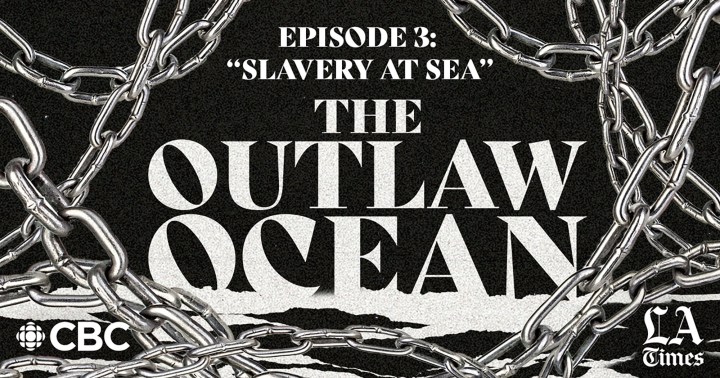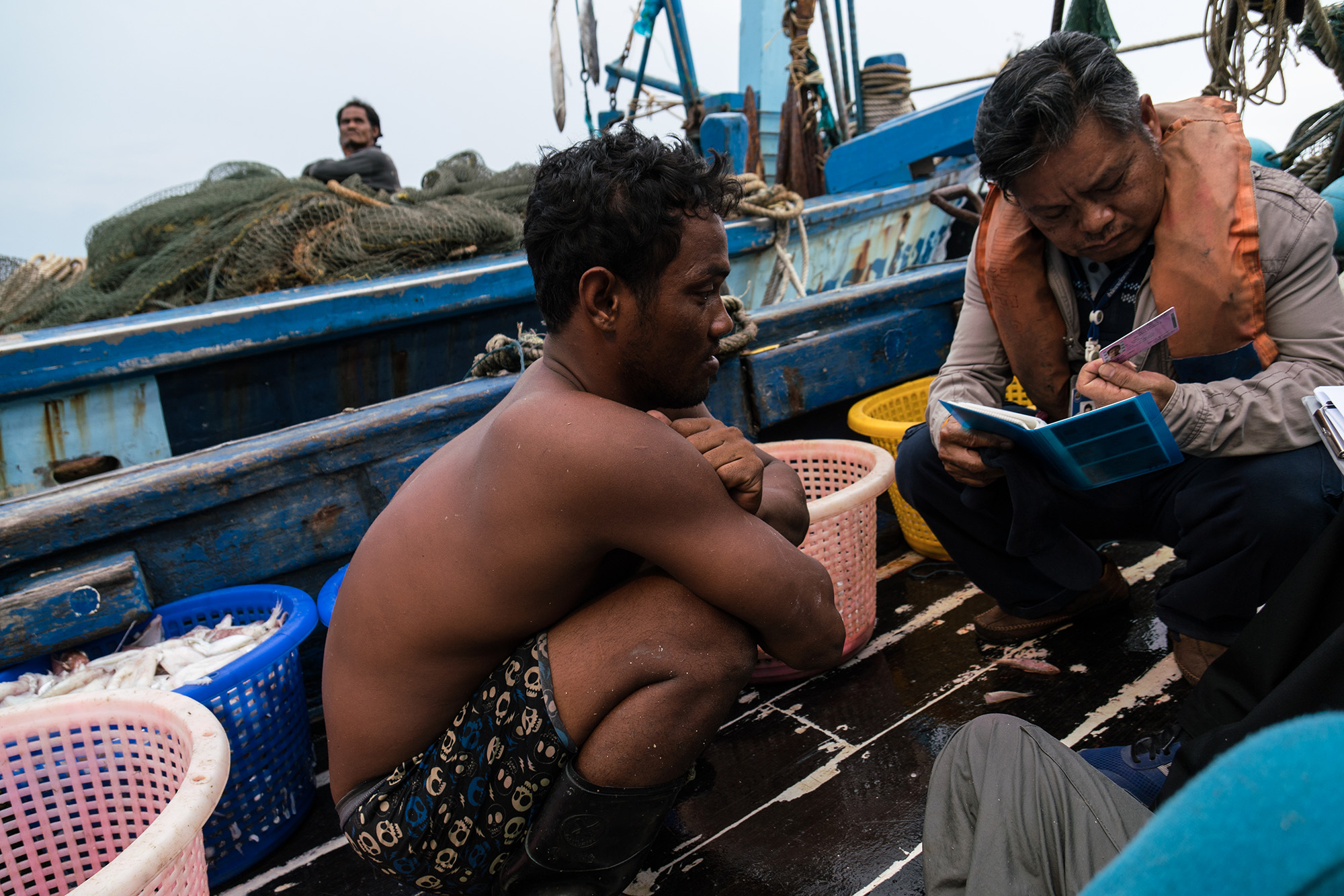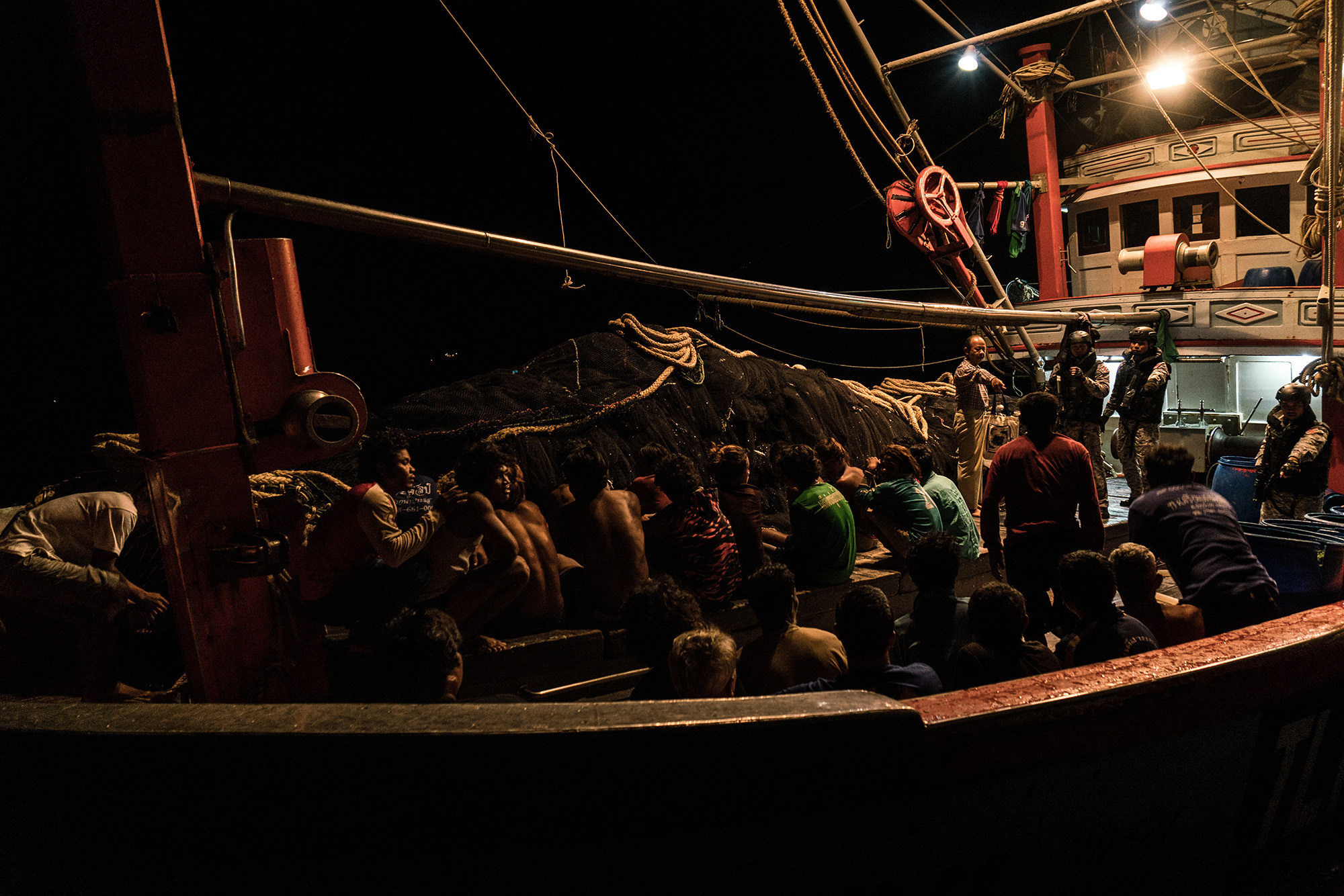THE OUTLAW OCEAN PODCAST
Episode 3: Slavery has not disappeared – it’s just moved offshore

While forced labour exists throughout the world, one place where it’s especially pervasive is the South China Sea – and especially in the Thai fishing fleet. This is partly because, in a typical year, Thailand’s fishing industry is short about 50,000 mariners, according to a UN report in 2014. As a result, tens of thousands of migrants from Cambodia, Laos and Myanmar are trafficked into Thailand each year to make up this chronic shortfall. Then, unscrupulous captains buy and sell the men and boys.
With rising fuel prices and fewer fish close to shore, maritime labour researchers predict that more boats will resort to venturing further out to sea, making the mistreatment of migrants more likely. The work is brutal.
In Thailand’s bloated, inefficient and barely profitable national fleet, captains require crew members to simply do what they are told, when they are told. No complaints, no matter how long the hours, how little the food, or how paltry the pay. In short, these captains rely on sea slaves.
The Outlaw Ocean Project, a non-profit journalism organisation based in Washington DC, boarded a Thai distant-water vessel using enslaved labour. On it, three dozen Cambodian boys and men worked barefoot all day and into the night on the deck of the purse seiner.
The third episode of the podcast series, The Outlaw Ocean, from CBC Podcasts and the LA Times, tells the harrowing stories of sea slavery.
Listen to it below:
Rain or shine, shifts ran 18 to 20 hours. At night, the crew cast their nets when the small silver fish they target – mostly jack mackerel and herring – were more reflective and easier to spot in darker waters. During the day, when the sun was high, temperatures topped 37°C – but they worked nonstop.
Drinking water was tightly rationed. If they were not fishing, the crew sorted their catch and fixed their nets, which were prone to ripping. One boy, his shirt smudged with fish guts, proudly showed off his missing two fingers, severed by a net that had coiled around a spinning crank. Their hands, which virtually never fully dried, had open wounds, slit from fish scales and torn from the nets’ friction. Infections were constant. Captains never lacked amphetamines to help the crews work longer, but they rarely stocked antibiotics for infected wounds.

Cambodian worker on a Thai fishing ship during inspection in Thailand. (Photo: Fábio Nascimento / The Outlaw Ocean Project, Thailand)

Cambodian migrant workers on a Thai fishing ship during an inspection. (Photo: Fábio Nascimento / The Outlaw Ocean Project, Thailand)
On boats like these, deckhands were often beaten for small transgressions like fixing a torn net too slowly or mistakenly placing a mackerel into a bucket for sablefish. Dispatched into the unknown, they were beyond where anyone could help them, usually on so-called ghost ships – unregistered vessels that the Thai government had no ability to track.
They typically did not speak the language of their Thai captains, did not know how to swim, and, being from inland villages, had never seen the sea before.
Virtually all of the crew had a debt to clear, part of their indentured servitude, a “travel now, pay later” labour system that requires working to pay off money they often had to borrow to sneak illegally into a new country.
There is this modern assumption, especially in the West, that slavery no longer exists. But debt bondage is still very much present. Like the Cambodian boys held captive and killed if they try to escape. This is what modern day slavery looks like. And until we modernise our understanding of that, we won’t know how to identify it, much less do anything about it. DM/OBP
Listen to Episode 1 here
Listen to Episode 2 here
Ian Urbina is the director of The Outlaw Ocean Project, a non-profit journalism organisation based in Washington DC that focuses on environmental and human rights concerns at sea globally.


















 Become an Insider
Become an Insider
Slavery still very much exists onshore, and in the continent that largely birthed it. The Chattel system is still the norm; I recall being in Venda at the time of an ANC election in the early part of this century some 20-odd years ago. President Mbeki was then seeking re-election and he sought the support of the local electorate. The Chief parlayed for a parcel of land that the tribe needed, and he guaranteed that all his Chattels would vote for the ANC which then got over 90% of the total votes in this Venda region.
Slavery exists and flourishes as long as control of the mind and free-will is exercised in this way.